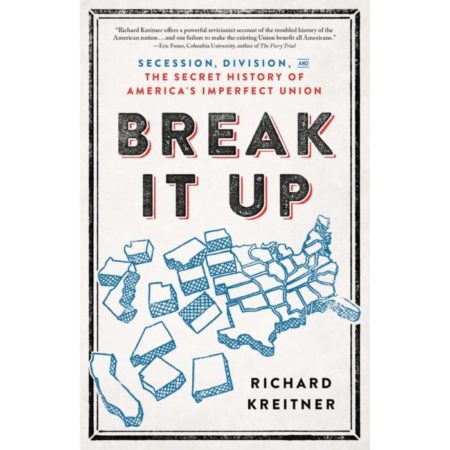
Kreitner
“A lot of abolitionists came together and tried to convince their Northern neighbors to secede from the Union.”
If you’d like your state to break away from the Union based on what happens on Election Day this year … well, turns out it’s not such an original idea.
Secession is a lot more common in American history than you may realize, according to the new book, Break It Up: Secession, Division, and the Secret History of America’s Imperfect Union by Richard Kreitner. The most well-known secessionist narrative is arguably that of the slaveholding South during the Civil War, but people in other regions of the US have also sought to self-extract including California, Texas, and on several occasions, New England. From the very beginning, the passengers aboard the Mayflower, Kreitner reminds us, thought of themselves not as pilgrims but as separatists, voyaging away from King Charles and England to form an overseas colony.
Kreitner writes for the Nation, and has deeply considered the subject of secession over the past five-plus years. This spring, he penned an op-ed for the New York Times about the regional compacts made during COVID-19 by some states—including Massachusetts—that he says may be a sign of the future.
“I had an opportunity to revise the book before it was published after COVID-19 hit,” he told DigBoston in a phone interview. “I did not need to. It was only that the issues I was talking about were more pronounced, more obvious.”
More recently, there was the stunning news about an attempted kidnapping plot against Michigan Gov. Gretchen Whitmer.
“The Whitmer story is shocking but not entirely surprising given the rising support for political violence on the far right, a story that has continued to develop and worsen even since I finished my book,” Kreitner wrote in a followup email.
Kreitner developed the book idea while researching contemporary events. Back in 2014, he was disheartened by what he described as the gridlock in Washington, DC. Republicans would block then-President Barack Obama’s policies, leaving him with no option but to use executive action, a move that could easily be reversed when a new chief executive takes office.
“Maybe it would be better if we split up into smaller countries,” Kreitner recalled thinking. “It might revive democracy, it might grow more efficient.”
He was surprised to find echoes of this sentiment when he dove into the archives of the Nation, which was founded in 1865, following the end of the Civil War. As he discovered, secession predated not only the war itself, but also the founding of the republic.
“Nobody told the story from the very beginning,” Kreitner reflected.
Early American history was a time of sectional rivalries and international intrigues. Great Britain, France, and Spain all encouraged secessionists in the young nation. Kreitner saw a parallel in Russian efforts to influence the 2016 presidential election, notably by promoting rival protests in Texas outside a Houston mosque, unbeknownst to the actual protestors.
“As far as secession, there were two challenges,” Kreitner said. “One, how to stitch together the [examples] I do talk about, how to talk about them in a narrative in an appealing way.” Also, he added, “If the secessionist movement is always in the foreground, the rest of American history is always in the background. The challenge was how much extra background content to include.”
Massachusetts readers might be especially interested in Bay State secessionist movements. During the War of 1812, when the US fought Britain, New England nearly broke away from the Union. A few decades later, secession was again taken up by Mass abolitionists like William Lloyd Garrison, who wanted no part in a Union that tolerated slavery.
In 1842, a group of 46 abolition-minded residents of Haverhill signed a petition to end the Union because of its financial support of Southern slavery. They took the letter to prominent Mass congressman John Quincy Adams, who brought it to the House floor despite Congress having zero tolerance for discussion of slavery. “John Quincy Adams biographies, general histories of the era, usually only [mention it] as an aside, a footnote,” Kreitner said.

Kreitner traveled to Haverhill to see the petition itself. The signers, he said, were “just ordinary people,” “shoemakers, cobblers, deacons at a church.” “They were not really like fiery radicals. They went to a hat shop every week to talk politics.”
The incident fits well within a broader narrative across Mass in the early 19th century—“a growing abolitionist movement in Boston in the 1830s, 1840s, 1850s,” Kreitner said. And while the Haverhill petitioners may not have been radicals, the movement itself had “the radical end of disunion, wanting the North to secede.”
The passage of the Fugitive Slave Law of 1850, which mandated returning escaped slaves, “led to riots in the streets of Boston itself,” Kreitner added, noting that in 1857 it was Worcester’s turn to take center stage in the drama, hosting a convention on disunion.
“A lot of abolitionists came together and tried to convince their Northern neighbors to secede from the Union,” Kreitner said. “It was an unpopular opinion, but a lot of people were sympathetic.”
Three years later, following the election of Abraham Lincoln as president, it was the Southern states that began seceding, leading to the Civil War. The head of the Worcester convention, Thomas Wentworth Higginson, ended up leading the first Black regiment of Union troops during the conflict.
Kreitner sees the Civil War with the same comprehensive lens through which he views secession in America in general. He wonders whether several other parts of the Union could have actually broken away—including the Confederate-leaning southern parts of Midwestern states like Ohio, Indiana, and Illinois.
“How much was real, how much was rumor, how much was really fears of Unionists in the Midwest, it’s not really certain,” Kreitner said. “It’s clear there was some conspiracy, a secret group that organized to lead a revolt in Chicago in 1864.”
That year, Chicago would host the national convention of the Democratic Party, rival of Lincoln and the Republicans. It was also home to Confederate prisoners of war. The ultimately unsuccessful conspiracy, Kreitner said, was launched “in order to liberate Confederate prisoners of war, form an army, and take over those parts. It’s a very little known story.”
Kreitner said that “after the Civil War, there were not really other major secessionist movements,” but his research shows how the injustices of the 19th century have had a long impact on divisions a century later and beyond. In the Mexican-American War, which predated the Civil War, the US annexed much of historical Mexico.
“Chicano or Hispanic people across the Southwest wanted to either return the land taken from Mexico after the Mexican-American War or establish a separate, independent republic,” Kreitner said.
The 1960s also saw a rise in Black separatist movements of people unhappy with decades of white supremacy in the South.
“The South found it got what it wanted—states’ rights, white supremacy,” after the Civil War, Kreitner said, noting that throughout the country, “white voters were all committed to racial hierarchy.”
A notorious compromise in 1877 ended the Reconstruction period and “was the basis on which the US survived through the 20th century, the first two-thirds, until the challenge of the civil rights movement,” Kreitner said. He calls it “a compromise between Democrats and Republicans, North and South, in order to resolve a contested election.”
Kreitner is worried that we’re headed for a reboot of America’s secessionist tendencies, and sees troubling signs in the plot to kidnap Whitmer.
“The boogaloo movement doesn’t only predict violent conflict in the future, they hope to bring it about,” he explained. “This is an outgrowth, obviously, of the militia movement that grew in the US in the 1980s and 1990s, but is now actively encouraged by the president of the United States and accommodated by the Republican Party. The Whitmer plot reads like something out of one of the dozens of (mostly bad) novels that imagine the United States breaking apart which I read while working on the book, only now it is really happening.”
Rich Tenorio is a writer and editor whose work has appeared in international, national, regional and local media outlets. He is a graduate of Harvard College and the Columbia University Graduate School of Journalism. He is also a cartoonist.

